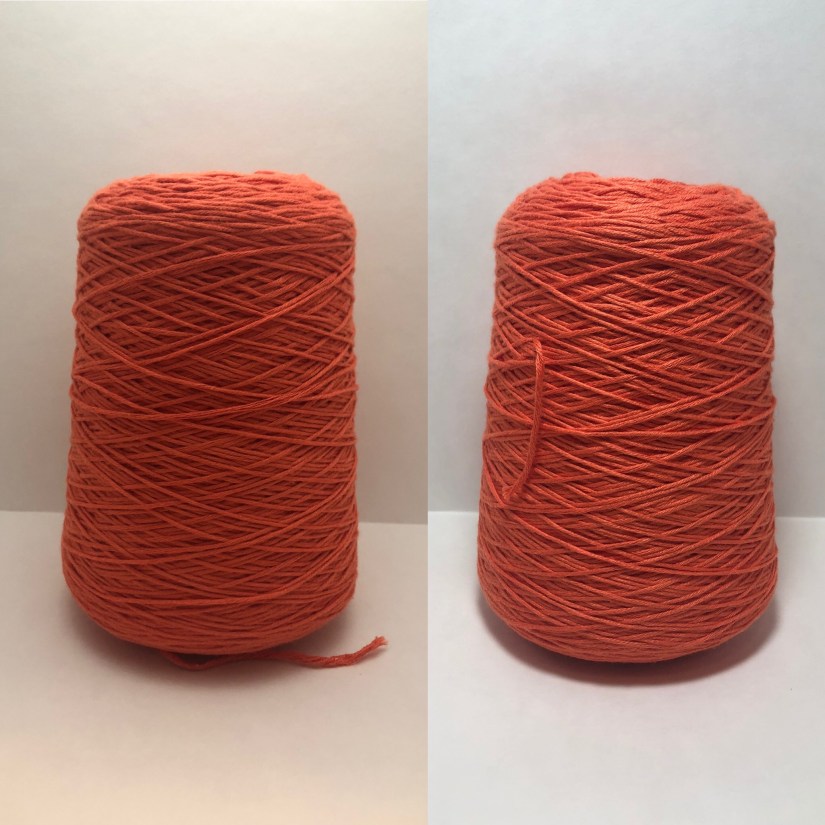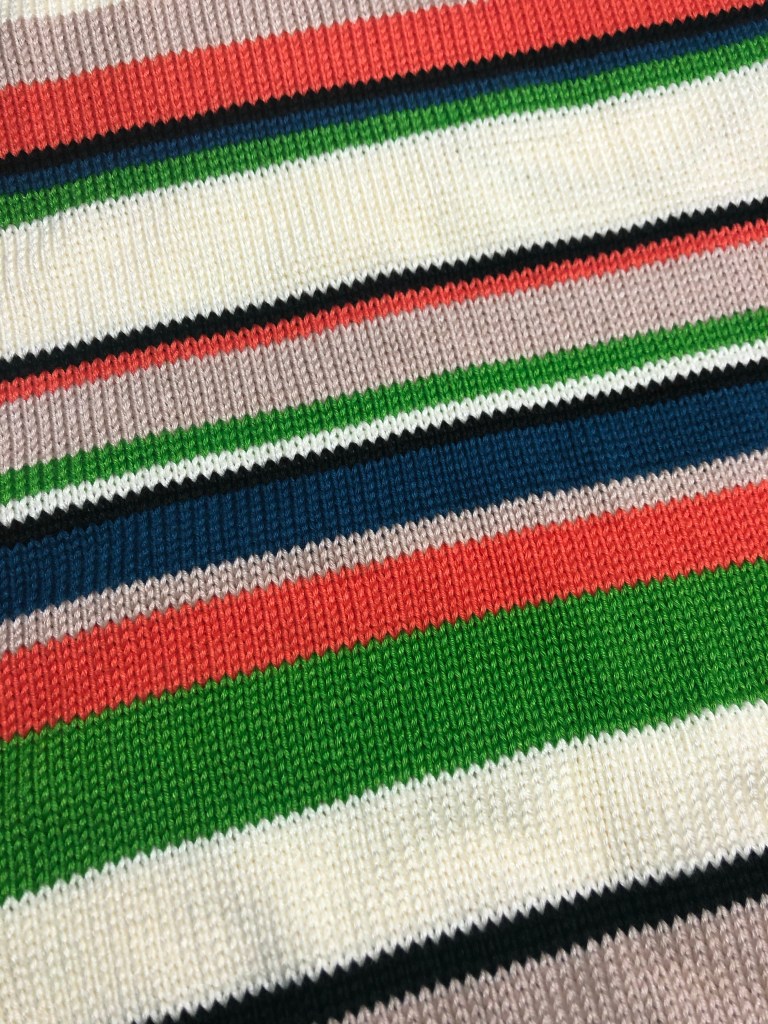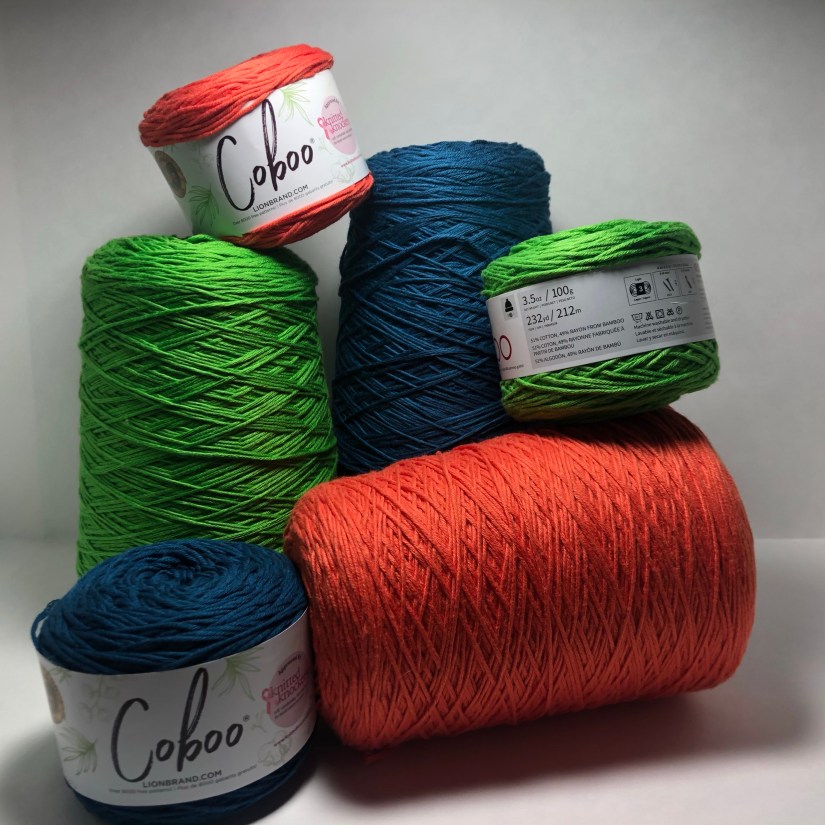Silk City Fibers is a wholesale coned yarn retailer that boasts more than 50 types of luxury yarn for knitting and weaving. Known in the past for their 100% rayon chenille yarn, they became part of Orchard Yarn & Thread Company, Inc., better known as Lion Brand Yarn Company in 2019. Perhaps due to the pandemic, in 2020, they opened up their online store and no longer require a wholesale account to purchase their yarns.
Cone put-up allows for much more yardage per item, and though the price per cone may seem daunting at first, remember to consider price per yard and the amount needed for your project. If you’re really buying in bulk, Silk City Fibers offers a discount after 7 cones and even more after 15 cones.
I remember hearing and feeling some concern about Silk City Fiber’s “luxury” yarn status when learning of their purchase by Lion Brand, but instead of seeing much of a change in Silk City Fibers, I have noticed a positive trend in Lion Brand Yarn’s lines with nicer, softer acrylics and new, sustainable and/or recycled yarn blends.
As a former yarn boutique employee, I’ll admit to some yarn snobbery. I’ll also admit that I wrote off Lion Brand Yarns very soon after I started knitting because I did not like what they offered, but my, have things changed for the better since then.
I’ll be reviewing more Lion Brand Yarns and Silk City Fibers offerings in the future, so stay tuned, but for now, here’s one of my Silk City favorites:
Cotton Bambu
All opinions are honest and my own. I am not affiliated with any company or individual mentioned or linked unless otherwise noted. I purchased this yarn myself and did not receive compensation for this review.

About Silk City Fibers Cotton Bambu
| Fiber Content | 51% Cotton, 49% Bamboo-based Rayon |
| Yardage/Meterage | 1,050 yards per pound |
| Ounces / Grams | 1.2 lbs |
| Yarn Weight | *3 / Light / DK |
| Made in | ** |
| Availability | Online, some LYS or Weaving shops |
| Put up | Cone |
*There is not a yarn weight listed for this yarn. Instead, you can estimate its yarn weight by “wraps per inch” around a standard No. 2 pencil or comparing it to yarns with known sizing.
**I was unable to find an exact location where this yarn is made, but many Silk City Fiber and Lion Brand products are made in China or in America with source fibers from varying countries.
Cotton Bambu comes in a very limited color palette of 12 solid colors. There is a slight sheen in the yarn due to the bamboo-rayon, as seen on the right in the picture comparison above. Allergy sufferers or those who are averse to animal fibers will enjoy the smooth cotton and bamboo-based rayon fiber content.
At 1,050 yards per pound and 1.2 lbs per cone, you’re looking at just over 1,200 yards per cone and around $0.25 per yard.
You can purchase Cotton Bambu from both the Silk City Fibers and Lion Brand Yarns websites. Your local yarn or weaving shops might carry Silk City Fibers yarns, but stockists are not listed on either brands’ website. You may be able to find old colorways or fiber combinations through Etsy or eBay sellers.
Care Guide
| Hand Wash | Yes | |
| Machine Wash | Yes | |
| Flat Dry | Yes | |
| Machine Dry | Yes |
When I first purchased color cards and then cones, this yarn was recommended dry clean only, so I’m glad to see its updated care status listed online.
Cotton Bambu machine washes and dries very well, but it is important to always work from measurements from a washed and dried swatch to account for any changes or shrinkage that could possibly occur in the wash.
If you decide to lay it flat to dry, know that it will take quite a while to dry fully and you may need to flip it so the underside is not damp. I noticed after steaming garments, so they were not soaked as they would be in a wash cycle. This is not unusual for cotton yarns as they are very absorbant.
Knitting Machine Compatibility
| 4.5mm Standard Gauge | Yes | |
| 6.5mm Mid-Gauge | Yes | |
| 8mm / 9mm Bulky Gauge | Yes |
This yarn works well at upper tensions on the 4.5mm standard gauge machine and works well with the ribber attachment. I most frequently use it on my mid-gauge SilverReed LK-150. I have not used it on a bulky machine, but it is an appropriate weight and would likely work well on any bulky depending on what fabric you are looking to create.
Swatches, Performance, and Blocking
If you’re curious about how I swatch yarn, please read this post.

Cotton Bambu runs smoothly through the machine and patterns well using a punch card. It makes a nice rib using the ribber attachment. If you need to rip out work due to a mistake, it loses a bit of its twist. Loose ends will un-twist and fray due to being a smooth, plant-based fiber, so be sure to securely weave in ends before washing.
If your cat decides to claw up a cone, the individual threads that make up the yarn will run and pull for a bit, so be sure to keep your yarn safe from predators when photographing and storing! I assume catching this yarn on needle hooks might have similar results with individual threads of the yarn pulling.
Mid-gauge SilverReed LK-150 swatch at Tension 4, washed cold on gentle and dried on low:
| Before | After | |
| 20 stitches | 4″ | 3.875″ |
| 30 rows | 4.5″ | 4″ |
Cotton generally shrinks some in the wash, but as long as you are working from the gauge of a “finished” or washed and dried swatch, you should not run into problems. (I cannot stress the importance of this enough!)
Though there was some shrinkage, there was minimal to no fuzzing or haloing of the yarn in the wash and no loss of stitch definition whatsoever in my swatches.
Using the above numbers, my swatch shrank about 3% horizontally/stitch-wise and about 11% vertically/row-wise.
If you’re worried about shrinkage, the rayon-bamboo content does more than simply add to a garment’s drape. Cotton Bambu blocks very well and gives you quite a bit of flexibility when it comes to any surprises you might find in your finished garment. I’ve been quite thankful for its blocking ability before when I miscalculated a stitch conversion factor and wound up with a garment that was just a bit too short for my liking.
Standard-gauge Brother KH-890 swatch at Tension 10, washed cold on gentle, dried on low, and gently steamed:
| Before | After | |
| 40 stitches | 6.5″ | 6.75″ |
| 60 rows | 6.5″ | 7″ |
When I say “gently steamed,” I mean that I passed the steamer head above the yarn swatch and used it to iron out wrinkles and unroll the sides of the stockinette stitch swatch. I did not pin or mark desired dimensions and pull or push the fabric to create stretch, I merely used the steam to relax the swatch to see where it would go without coaxing.
You cannot “kill” cotton as you can acrylic, and bamboo-rayon doesn’t quite “kill” like a normal acrylic will and lose all of its elasticity, but steaming Cotton Bambu does increase the drape. The cotton content prevents and protects the rayon-bamboo from behaving as a fully acrylic yarn will.
Using the above numbers for my standard swatch, my steam blocking was able to increase the horizontal/stitch gauge by around 4% and the vertical/row gauge by around 8%. Over something like the 15″ body of a garment, that is an increase of over an inch of length.
Blocking can make a significant difference, and if you need more give than a gentle block, Cotton Bambu will be able to stretch more than I demonstrated, but it does have limits due to the cotton content. I suggest double-checking your math instead of relying on the yarn to save you as I had to do!
Pattern Ideas
I’ve used Cotton Bambu in many projects and have plans for many more for both customers and myself. Click the pattern name for a link to the download page of each pattern.
Left: Kelso by Meghan Kelly (hand-knitting pattern) in Silk City Fibers Cotton Bambu Color 116 Grass. $8.00 USD on Ravelry. Sample knitted on SilverReed LK-150
Right: Mid-Gauge Ladies Lace Yoke Top by Irene Woods (machine knitting pattern). Free from Clearwater Knits. Size XL on a Size L dress form. Sample knitted on SilverReed LK-150
Both of these patterns involve hand-transferred lace. Irene Woods’s pattern includes very detailed information on the lace in a circular yoke for those who have not tried it before.
Lion Brand CoBoo
I have not been able to officially confirm this, but I believe Lion Brand’s CoBoo yarn is Silk City Fiber’s Cotton Bambu yarn.

Lion Brand CoBoo comes in 3.5 ounce, 232 yard cakes, is 51% cotton and 49% rayon-bamboo, and has the same care instructions. (The online listing description states 50/50 content, but the actual ball band label reflects the 51/49 ratio.)
While CoBoo comes in 20 colors, it features many exact matches to Cotton Bambu right down to color names (Grass, Steel Blue, and Orangeade are pictured above). It also has the same number of plies and the same twist.
Lion Brand’s website list price is $5.99 per cake, which puts price per yard around the same $0.25 as Cotton Bambu, but you can find it on sale for as low as $2.99 per cake on JoAnn’s website depending on their sale of the week.
Final Thoughts
Silk City Fibers Cotton Bambu is a wonderful yarn, and at $30.99 a cone, it feels pricy. Silk City Fibers touts themselves as a luxury brand, after all, and I feel they live up to it with Cotton Bambu. At around a DK weight, Cotton Bambu makes substantial but not heavy garments appropriate for spring, summer, and fall or year-round wear in warmer climates. Its drape adds to the luxurious and smooth feeling of this yarn against the skin.
For a similar drape and smooth feeling and the same ~1200 yard amount in Berroco Comfort DK, a 50/50 Nylon Acrylic blend with 178 yards per skein at $3.75 per skein, you’d pay around $27.00 (about $0.23 per yard). I think a cotton blend costing about the same as a nice, quality acrylic yarn is a very good deal. (For a review of Berroco Comfort in Worsted weight, check out this post.)
With only 12 colors to choose from, Cotton Bambu has work to do in the color department. Three of the twelve Cotton Bambu colors were added very recently, so I am hopeful for more colorways in the future. Lion Brand’s CoBoo version it better at 20 colors. If you’ll be working with a smaller amount of yardage or you want to do colorwork, I’d opt for the CoBoo version.
In fact, if you simply want to try this yarn before you invest in an entire cone, I recommend choosing the CoBoo version first.
Cotton Bambu is a wonderful yarn and one of my absolute favorites overall for any type of knitting, but price and limited color palette affect its rating when I look at it more objectively. The fact that a more colorful and widespread/readily available through big box craft store version is around detracts a bit from its rating, for me. Combining all of that with great drape, a smooth and sleek feel, and a decent price, I give Silk City Fibers Cotton Bambu a 3/5.
Have you used Silk City Fibers Cotton Bamboo before in your machine knitting? What about in your hand knitting or weaving? What kind of projects did you use it for, and what did you think of its performance?
Are there other properties or categories you think I should include in my yarn reviews? What yarn should I review next? Let me know in the comments!



